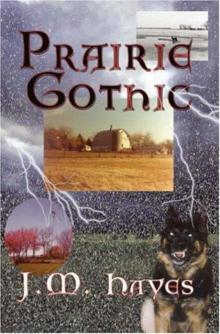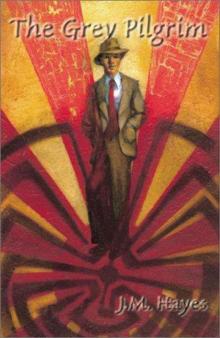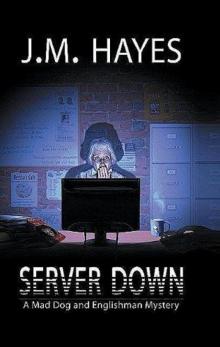- Home
- J. M. Hayes
English Lessons
English Lessons Read online
English Lessons
A Mad Dog and Englishman Mystery
J. M. Hayes
www.JMHayes-Author.com
Poisoned Pen Press
Copyright © 2011 by J. M. Hayes
First Edition 2011
10 9 8 7 6 5 4 3 2 1
Library of Congress Catalog Card Number: 2011920313
ISBN: 9781590589151 Hardcover
ISBN: 9781590589175 Trade Paperback
ISBN: 9781615952816 epub
All rights reserved. No part of this publication may be reproduced, stored in, or introduced into a retrieval system, or transmitted in any form, or by any means (electronic, mechanical, photocopying, recording, or otherwise) without the prior written permission of both the copyright owner and the publisher of this book.
The historical characters and events portrayed in this book are inventions of the author or used fictitiously.
Poisoned Pen Press
6962 E. First Ave., Ste. 103
Scottsdale, AZ 85251
www.poisonedpenpress.com
[email protected]
Contents
Contents
Dedication
Epigraph
English Lessons
Afterword and Acknowledgments
More from this Author
Contact Us
Dedication
For my greats—
Brice, Kyle, Christi, Tracy,
Andrew, Matthew, & Justin.
May you make a world with
no need for guns and no place for bigots.
Epigraph
I remember America,
I remember it well,
When you could walk downtown in the middle
of the night
Without the smell of fear on your shoulder
As you jump at every sound
And you never look in the eye of any stranger
Who could easily gun you down.
I remember America,
I remember every town,
When crack was the sound that caps would make
In the only guns kids would have around.
—John Stewart (1939–2008)
“I Remember America”
English Lessons
The governor-elect of Arizona smiled at Officer Heather English, though it took some help from a gust of wind to pucker his cheeks and lift the corners of his mouth. That was because his skin had been tacked to a weathered wooden wall to cure. Upside down, though the wind lifted and twisted his face so Heather could recognize it. She might not have done so, even then, since the bone structure beneath the skin is critical in giving a face its shape. Soon-to-be Governor Joe Hyde—and Heather was quick to note the irony of his name and his current condition—had dramatic wavy locks and an odd, twin-pointed beard. Heather had only seen two like it. One on this man. The other, on photographs of Sir Richard Francis Burton, nineteenth-century explorer of holy cities and dark continents. A star-shaped scar above the right eyebrow matched Hyde, not Burton, so this fleshless face, and the mostly hairless pelt attached to it, must, she realized, belong to the governor.
Heather was not thrilled at encountering Arizona’s new governor here, not that she would have cared to meet him any time. He was a law-and-order camera-ready sheriff who’d run an independent campaign in the last election and won, apparently, because a vote for him was seen by most as a vote for “neither of the above.”
Arizona was conservative, but Hyde flew to the right of the average emperor. Hyde had run his county like a private fiefdom for the benefit of himself and his friends. He’d campaigned against both parties, promised tax cuts for everyone, guaranteed he’d seal the border, and planned to round up every illegal alien for immediate deportation.
Xenophobia was popular along the border these days. Experts claimed his administration would wreck the state’s already fragile economy. Voters hadn’t cared. And Hyde had suggested God should visit the most terrible of deaths upon him if he ever lied to the electorate. Let him suffer the worst anguish of any of the saints or martyrs if he failed to govern wisely. Heather wondered if someone had taken Hyde up on the proposal, choosing the fate of Saint Bartholomew, who was said to have been flayed alive and crucified upside down. If not, perhaps someone who expected to be skinned by the governor’s policies had made a pre-emptive strike.
As a Sewa Tribal Police Officer, Heather English preferred not to see even the most incompetent politicians assassinated. Recalled, was more to her taste. Worse, she was the first law enforcement officer on the scene. Hyde’s assassination was going to be big. Every network would jump aboard this story, 24/7. It would take something apocalyptic to knock Hyde’s bizarre murder from the headlines. Some talking heads had begun passing along the governor’s thoughtless ramblings as if they were mighty truths issued straight from a burning bush—speaking of his inevitable run for the presidency.
Oh, God. This would make her life a nightmare. But then it hadn’t done much for Hyde, either.
The call had come in at six last night. According to an anonymous tipster, someone with no business on the reservation was working an old mine in this canyon.
Truly anonymous tips were hard to get these days, unless you used a pay phone on the Mexican side of the border, as this informant had.
Times were tough. The price of gold had skyrocketed as fast as jobs disappeared. Even this lonely spot, long believed to have been mined out, might produce enough ore to make trespassing on the Sewa Reservation worth the risk. According to the caller, the miner always hit on weekends and holidays. And so the report went on the list—something to be checked out as soon as an officer could be spared. Lucky Heather was that officer.
Being a Sewa Tribal Police officer wasn’t everything she’d expected. Her father was a Kansas sheriff. She’d lived around law enforcement all her life, understood the majority of her job would be sorting out minor arguments, misunderstandings, and family or neighbor fights. Some of those could get nasty. And she’d known her life would be most at risk when she was untangling domestic disputes involving alcohol and firearms. Because of her father’s career, she’d been better prepared for the job than the average rookie. But this was a tribal police force. And she wasn’t a member of the tribe. There were still hard feelings about that. Some people on the force hadn’t forgiven her for being marginally Cheyenne instead of fully Sewa. Especially when she looked about as Anglo-All-American girl-next-door as possible—light complexion, hair color pale enough to seem blond among Sewas, a sprinkle of freckles, sparkling eyes more green than hazel. “The White Girl” was what they called her behind her back. Some of them said it to her face.
So she asked for the dirty jobs. Took the holiday weekends. Did her best to be low profile, but a solid performer. Most of them still had little use for her. That was why she was out here doing a steep hike through a lonely canyon on Christmas morning. It would get worse now, once word got around that “The White Girl” had stepped into the prime spot in the biggest case the Sewa Tribal Police had ever faced. Between the ravenous press and a lot of fellow officers who’d be happy to get her fired, she was going to be under the microscope.
Those thoughts flashed through Heather’s mind in the moment between recognizing Governor Hyde and realizing there was an envelope lying at the foot of the wall on which he hung. It was secured from the day’s cool breezes by a fist-sized rock.
You found a murder victim, you started by making sure the murderer wasn’t still around.
Heather didn’t think so. Nor anyone else. The wall Hyd
e decorated was the only one still standing. She’d noticed it as she hiked up into the canyon. And the curiosity of a single wall out here in the middle of nowhere had drawn her through the thickets of scrub mesquite that lined the dry wash at the canyon’s center. In getting to the wall, she had climbed past the canyon’s best hiding places. Still, she drew her weapon from her holster. If this were an off-duty hike, she’d have left the gun in her vehicle, a couple of miles back where the road had been washed out a few storms ago. From that point on it was just a rough trail. A track—too rugged and strewn with boulders for her to be sure whether anyone had been up here recently, though she hadn’t seen any signs.
Heather didn’t like guns much, but this one felt reassuring as it filled her hand. SIG-Sauer P-226. She might not like it, but she was good with it. She consistently shot the best scores on the Sewa police range. Another reason some of the fellows weren’t thrilled to have her around. She might try to keep a low profile, but she wouldn’t intentionally miss a target just to reassure the guys she worked with that they had big cojones.
She had begun to fall in love with this oddly lush desert that was her new home. A day of solitude appreciating jagged mountains, thorny brush, prickly cactus, and warm December sun while she convinced a twenty-first-century prospector to give up his diggings had seemed a perfect alternative to the normal excess of food and gifts. A good way to spend a Christmas half-way across the country from most of her family and refocus on the things she loved about this job, and why she’d moved a thousand miles to take it. Only there were clouds instead of sun, the high thin kind that made for spectacular sunsets but offered no chance of rain. A cool breeze blew away the warmth. And, what she had found here had nothing to do with a simple eviction notice.
She drew her cell to report her discovery and ask for back-up. Her cell showed not a single bar. That’s the way it worked in the Arizona wilds. Too many mountains. Too many empty places without enough customers—places like the Sewa Reservation. She didn’t have a radio with her. There was one down in her unit—the tribal force couldn’t afford redundant systems. Cells were cheap and fast and worked just fine unless you were out in the boonies. In fact, her cell might work if she hiked up the side of the canyon to a crest. But before she did that, she had to secure the crime scene. From whom, she wondered? But she had found i, and they would come. Besides, those were the rules.
She pulled a role of tape out of her fanny pack and roped off a big circle around the governor. The thorns on the plants she used to establish a perimeter meant she didn’t have to waste a lot of time with fancy knots. Other than Hyde’s hide and the envelope, Heather still saw no signs that anyone had been here since that wall was abandoned. No footprints, even though there was enough sand in the rocky soil to show the tracks she’d left climbing in. Well, she could document that. She pulled out her cell phone to take pictures.
She began with several of Hyde taken from a variety of angles to show how the skin had been nailed to the wall and that there was no evidence of significant trauma to it, other than being skinned. And that there were no footprints nearby except hers. She photographed one of her prints and the pattern on the sole of her shoe to make that clear. She backtracked down to the wash, looking for others. There were some scuffs, but nothing with a clear outline. She photographed them anyway.
Next, she moved in on the skin for close-ups. There were some scrapes, and a few old scars. Some marks on the hands that might have been defensive wounds. She turned them all into jpegs. She took no close ups of Hyde’s sex organs. There was nothing remarkable about them and no evidence he’d been molested there—not since his circumcision, anyway.
Finally, the envelope. She got out a plastic evidence bag and a pair of latex gloves. She lifted the rock and dropped it in a bag. The wind immediately picked up the envelope and tumbled it into a clump of scraggly desert broom. She retrieved it. There was a neatly printed name—ink jet, most likely—on the front of the envelope. No great surprise. That the name was “Heather English,” however, was another matter entirely.
***
A thousand miles northeast, it was noon and Sheriff English had done all the laundry, vacuuming, and dusting he could stand. His house was too big and too empty. He would never get used to that. His wife, Judy, had been dead for six Christmases now. And his daughters, though usually home for the holidays, had begun attending college and living in distant places even before that. This year, his daughters weren’t here to help cut the loneliness. One was a tribal police officer in southern Arizona and on duty today. The other was wrapping up her dissertation because an honest-to-God paying faculty position waited for her next fall if she met her deadlines and scored that Ph.D. on schedule in the spring. So, this Christmas, the empty house was getting to him.
He flipped on the TV for companionable noise and decided he couldn’t handle It’s a Wonderful Life again, or even an alternative holiday “classic” like Die Hard. So, though he wouldn’t get paid for working on Christmas, he let himself out of the house, climbed behind the wheel of Judy’s old Taurus, and headed for the office to do paperwork.
Actually, the question of getting paid for working Christmas hardly concerned him. Benteen County, Kansas, never an economic dynamo of the Plains, was in the middle of something resembling a full-scale depression at the moment. The county owed him six months’ back pay, which he would have been demanding if he and Judy hadn’t been smart enough to set up a trust fund to pay for their daughters’ educations. Claiming the money would also probably cost him the only two employees he had left. Losing Deputy Wynn wouldn’t matter much. About all Wynn was good for was warm-body duty. But Mrs. Kraus, his office manager, was irreplaceable. She knew everything about everybody in the county. More than once, she’d talked an emergency situation down into a call that didn’t even have to be answered, and not just because there was no one to answer it.
Today’s paperwork involved his department’s budget. Deputy Wynn and Mrs. Kraus hadn’t been paid up to date either. And one of the perks of his office was supposed to be the use of the county’s black and white. Except it was in the shop waiting for the board of supervisors to fund the replacement of a blown head gasket. Or perhaps something worse, once a mechanic pulled the head and discovered the true extent of twelve years and 380,000 miles of wear. He wanted it back, though, because strangers didn’t respect an old Taurus station wagon as a legitimate vehicle of law enforcement, even with the temporary light bar he’d strapped across its roof.
He didn’t get to the courthouse. As soon as he reached Veteran’s Memorial Park he realized there was a disturbance at the Buffalo Springs Nondenominational Church. A two-tone tan Ford Torino of mid-seventies vintage was trying to back out into the street from where it had been parked beside the church. Trying was the operative word. As was failing.
Kansas weather had been typical the last few weeks. Warm one day, bitterly cold the next. With occasional rain, sleet, and snow between brief moments of bright sun. The soil alternated back and forth between mud bog and diamond-hard dirty ice. It had been warm and melting yesterday morning. Then another cold front blew through, blessing the county with frozen puddles, black ice, and a couple of inches of fresh snow. The thermometer was hovering around zero this bleak, gray Christmas morning, reminding folks of one more reason to move away from Kansas if the economy ever improved enough to give them another chance.
Apparently the slight rise between the church and the street had frozen into an insurmountable obstacle, at least for the Torino. The car’s owner lived at the end of the sheriff’s block, and the edge of town. She was the proverbial little old lady—prim, proper, and looking as sweet as the honey her husband had harvested from the hives their back yard held before he passed away. Except when she had a nasty rumor to spread or lost her always fragile hold on the temper the sheriff thought had helped send her husband to an early grave. The frustration of failing to back into the street
had evidently unleashed that temper again. In a big way, if the scrapes and dents her Torino accumulated as it played bumper pool with the cars parked on either side were an indication. Their horrified owners shouted for her to stop, as did a considerable portion of the congregation, all of them discreetly behind the vehicles she kept ramming.
The sheriff parked his Taurus behind her. Since that was where she had been unsuccessfully trying to go for several minutes, it seemed the safest place. He got out of his car, considered the slick footing, and reluctantly reached back inside for his cane.
Most counties would have replaced a crippled sheriff, even one who had taken a bullet in the line of duty—a fragment that chipped the sheriff’s spine and was putting him through a gruelingly slow recovery process. He was finally walking reasonably well, when the weather permitted. But there was no sense in risking further injury, not on snow and ice and in the vicinity of a crazed driver.
“Stop her, Sheriff,” someone shouted.
“Look what she’s done to my car,” another parishioner complained.
“Mrs. Walker, turn off your ignition,” the sheriff called.
Lottie Walker hunkered down in the seat and shoved the accelerator to the floor. The back wheels whined in slush of their own creation and she skewed into what had been an attractive Acura until moments ago. She must have thought she might still make a clean getaway if she could only reach the street. As if there were another Torino of this color combination and vintage with which she might be confused in the county, maybe even the entire Great Plains.
The sheriff drew his gun but the tires didn’t slow any. The Torino slalomed over into an old Chevy that was receiving its own share of body damage. The sheriff limped across the berm that prevented her exit, and headed for the church building on the far side of the Acura. The crowd, suddenly silent, parted in front of him. He used the space between the Acura and the wall to get more or less in front of Mrs. Walker’s Torino.

 Broken Heartland
Broken Heartland Prairie Gothic
Prairie Gothic Spirit and the Skull
Spirit and the Skull The Grey Pilgrim
The Grey Pilgrim Plains Crazy
Plains Crazy English Lessons
English Lessons Server Down
Server Down